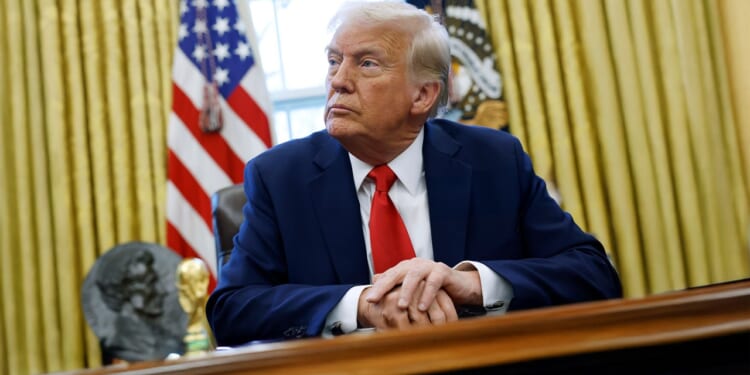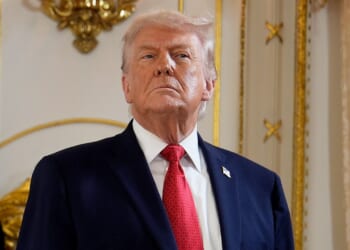China needed to survive and get the Americans to reopen trade without losing much in the way of key industries. In that sense, it clearly won the trade war.
For all his faults, President Donald Trump continues defying the odds by making peace and prosperity a cornerstone of his foreign policy. Of course, not all his initiatives are successful (or even a good idea). But many of them are. Flying into Malaysia over the weekend for a whirlwind set of meetings with regional leaders, Trump secured a deal formally ending the Thailand-Cambodia conflict—marking yet another addition to the “Conflicts Resolved” column.
But then came an even better development: the Trump administration had established a preliminary framework for a deal with the Chinese trade negotiation team.
The White House (and most of the Western press) argue that Trump’s threat of a 100 percent tariff increase on Chinese imports was what sealed the deal. Until that point, the trade talks had been frozen. But after the meeting between United States Treasury Secretary Scott Bessent and his Chinese counterpart, there has been real movement. So much so that President Trump believes that, by the time he meets Chinese President Xi Jinping, they will finalize a trade deal.
What’s Going on with the US-China Trade War?
As part of the tentative agreement, China will delay or ease export controls on rare-earth minerals, which are crucial for high-tech manufacturing and military supply chains. China has also promised to make “substantial” purchases of US agricultural goods—notably soybeans—as part of the trade rebalancing, returning Chinese spending to agricultural areas in the Midwest devastated by its withdrawal.
In return, not only will the Americans not institute the onerous tariffs on Chinese imports, but Washington will continue to allow for high-end NVIDIA semiconductors to be sold to Chinese firms.
This is a continuation of a deal first crafted in August in what was obviously a conciliatory move by Washington to keep Beijing from fully exercising its threats to impose tighter export controls on heavy rare earth minerals going to the United States.
The Guardian cautions that this is not yet a comprehensive deal but merely a framework. Many of the details still need to be ironed out and formally agreed to. Yet, it is clear that for both Washington and Beijing, the prospects of a truce in the ongoing trade war is a needed reprieve.
There remain deeper structural issues, though. How will access to Chinese markets be affected? How much danger is there for US intellectual property in terms of technology transfer to China’s vast market?
The Washington Post also highlights how rare-earth mineral controls by Beijing have merely been delayed, not removed. It is still possible, therefore, that China could complicate America’s access to critical rare earth mineral sources at a place and time of Beijing’s choosing—especially when it has already been proven that rare earth minerals are the Achilles’ Heel of the nearly $1 trillion per year US defense establishment, which requires those resources to build its weapons and platforms.
Undoubtedly, China struggled under the weight of the trade war. At the same time, much of that weight was imaginary. After all, Trump often threatened publicly high tariffs, but would often shy away from committing fully to imposing—and maintaining—those tariffs. This gave Beijing key insight into the psyche behind the US trade war against them.
China “Won” the Trade War
And the trade war was hurting some of Trump’s biggest supporters in the US agricultural sector. While China, whose economy has remained shaky since the onset of its property sector crisis in 2021, was harmed by the trade war, the fact that Trump clearly blinked first indicates how radically changed the geostrategic and, more importantly, geoeconomic situation has changed.
For the United States, the task of winning the trade war it had started was much harder than it was for China. Washington needed to not only extract meaningful concessions from China, but it needed to create the conditions to allow for industries to re-shore to the United States or, at least, to “friendshore” to countries other than China so that Beijing couldn’t hold America hostage anymore with its critical supply chains.
Beijing needed to survive and get the Americans to reopen trade without losing much in the way of key industries. In that sense, China won. In a very real way, China exacted critical hits upon the Americans in ways that Washington was not prepared to experience.
Because of that, Bessent needed to get even a preliminary deal to signal to American markets that stability was coming. This, at a time when the US is clearly entering into what may very well be a deep recession (fears of a deep recession come from an assessment conducted by Phinance Technologies earlier this year). A new trade deal with China will ameliorate the pain of what’s coming to the United States economy.
It will do the same for China, which has been in an economic downturn since COVID-19 first appeared in Wuhan, too.
Rare Earth Minerals Are the Key to Why China Won
But as long as the rare earth mineral threat deployed by China, as well as the damage done to American soybean farmers, continue to be a factor, Washington will continue struggling to successfully wage any trade war against Beijing.
What’s more, Trump will take any inkling of a deal and turn it into a PR victory for a trade war that he had started and was losing. The only way that the US can possibly win a renewed round of fighting in the trade war with China would be to fully reorient itself away from relying upon China for rare earth minerals (which is much harder than it sounds) and diversify its agricultural sector away from relying so much on China to sustain itself.
Trump hurt China in the trade war, yes. But China, thanks to the rare earth dominance it enjoys, beat America.
The rest of the world knows it, too. Trump is happy to have a reprieve. Xi is satisfied knowing that, for now, China has the dominant position in any such trade war again. This feeling of imperviousness will translate eventually to the military domain, as China seeks to lay claim to neighboring Taiwan.
About the Author: Brandon J. Weichert
Brandon J. Weichert is a senior national security editor at The National Interest. Recently, Weichert became the host of The National Security Hour on America Outloud News and iHeartRadio, where he discusses national security policy every Wednesday at 8pm Eastern. He is also a contributor at Popular Mechanics and has consulted regularly with various government institutions and private organizations on geopolitical issues. Weichert’s writings have appeared in multiple publications, including The Washington Times, National Review, The American Spectator, MSN, The Asia Times, and others. His books include Winning Space: How America Remains a Superpower, Biohacked: China’s Race to Control Life, and The Shadow War: Iran’s Quest for Supremacy. His newest book, A Disaster of Our Own Making: How the West Lost Ukraine is available for purchase wherever books are sold. He can be followed via Twitter @WeTheBrandon.
Image: Shutterstock / Brian Jason.


















